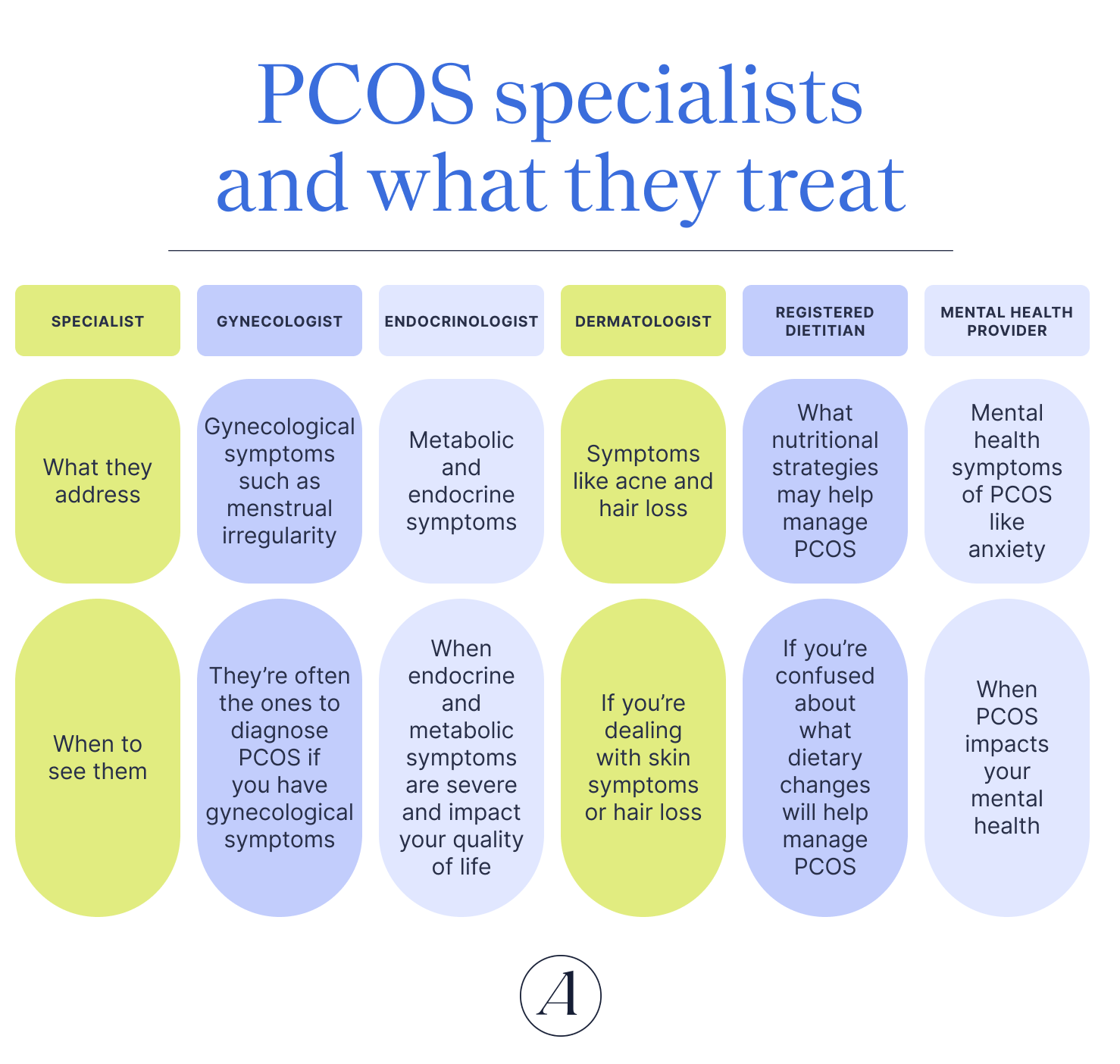
Endocrinologist vs. gynecologist: Who treats PCOS best?
Potential PCOS symptoms run the gambit. Someone may experience fertility problems, menstrual pain, excessive hair growth, issues regulating blood sugar, mental health problems, and more. This wide array leads many with PCOS to ask: What type of healthcare provider can successfully address all those symptoms? That’s actually a trick question, since a team of PCOS specialists often works better. Here’s who you may want to work with.
Polycystic ovary syndrome (PCOS) doesn’t impact everyone the same. For some, it leads to irregular menstrual cycles and infertility. Some people report experiencing excessive hair growth on their body, while others have hair loss on their scalp. This smorgasbord of possible symptoms leaves many asking who is the best doctor for PCOS? There isn’t one provider to address all symptoms, but multiple types of PCOS specialists that may be involved in care, with one often coordinating between different specialists and acting as your “go-to” provider.
“There are so many things that can be affected by PCOS, and not every single person with PCOS is going to present in exactly the same way,” says Hilary Booth, MS, APRN, WHNP, a women’s health nurse practitioner at Allara, “It's important to have someone who knows what to look for, how to manage it from several angles, and is up to date on their research and education.”
Ahead, we’ll detail who is the best provider to coordinate care, as well as when it’s beneficial to see an endocrinologist, gynecologist, reproductive endocrinologist, dietitian, dermatologist, and mental health provider. Treatment for PCOS isn’t always cut and dry, but with the right specialists in your corner, it is possible.
PCOS specialists and what they treat
Like most health conditions, PCOS doesn’t work well with a one-size-fits-all approach, and symptoms encompass many areas of wellbeing. As a result, a team of PCOS specialists is often better than one individual. “PCOS is often treated by multiple specialists to ensure that patients are getting every need addressed by the most appropriate person possible,” says Booth.
But who exactly do you want on your team roster? Depending on your symptoms, the answer may include a gynecologist, endocrinologist, dermatologist, dietitian, and mental health provider.

Gynecologist
“OBGYNs are often introduced to PCOS when assessing young adults for irregular cycles, bad acne, or fertility issues,” says Booth. As a result, they’re often the ones to diagnose the condition.
There is no official test to diagnose PCOS, and gynecologists often use a few diagnostic assessments, such as a pelvic exam that looks for signs of high levels of male sex hormones, a pelvic ultrasound to look for cysts, and blood tests to assess hormone levels.
After diagnosis, they often play a role in treatment, typically managing gynecological symptoms. “Gynecologists are often working with patients to help with menstrual regularity and fertility to ensure hormonal balance in the face of PCOS,” says Booth.
If a gynecologist wasn’t the provider who diagnosed your PCOS, they may still be an important player on your care team, especially if your symptoms include irregular or painful menstrual cycles or if you’re trying to get pregnant.
Endocrinologist
Since PCOS is a hormone disorder, some people are referred to an endocrinologist for PCOS. Typically, this referral happens if metabolic or endocrine symptoms are more severe, such as excessive hair growth or sudden weight gain without a direct cause. It is also possible to be referred to an endocrinologist before you have a PCOS diagnosis, as they can identify the condition too.
“Endocrinologists have specialized training in the entire endocrine system and are going to have more training and knowledge in managing some of the higher severity metabolic issues, like diabetes and metabolic syndrome,” says Booth, “They are also able to assess for possible adrenal issues and manage those more thoroughly than gynecologists.”
Growing evidence also suggests it may be helpful to see an endocrinologist before severe symptoms or complications occur, since catching these earlier often leads to better results. In routine check-ups, endocrinologists can screen for complications like insulin resistance and metabolic syndrome. Depending on your care plan, another provider like a primary care doctor may also carry out these screenings.
Reproductive Endocrinologist
If you’re trying to get pregnant or experiencing more severe symptoms, you may see a reproductive endocrinologist for PCOS instead of a general endocrinologist. The name is a bit deceptive, as reproductive endocrinologists are actually gynecologists who have specialized training in preserving fertility and hormonal health. You can think of them as an expert who works at the intersection of gynecology and endocrinology, which is conveniently right where PCOS sits too.
Seeing this type of specialist may be especially important for those seeking in vitro fertilization (IVF), a medical procedure for infertility. You may also be referred to a reproductive endocrinologist to deal with hair loss or other issues that aren’t being successfully managed by an endocrinologist or gynecologist.
Dermatologist
In one study, 43% of people with PCOS experienced adult acne. While you can see an endocrinologist for acne, many find it useful to go to skin specialists, aka a dermatologist. While this specialist is an expert in managing skin conditions, including acne, their role is more than skin deep (pun intended). They can also treat hair loss.
Not all dermatologists are up-to-date on PCOS guidelines, however, meaning who you work with matters. Ideally, opt for a dermatologist who advertises that they have additional training or experience managing symptoms of PCOS or ask another care provider, such as gynecologist or endocrinologist, for a referral.
Dietitian
Lifestyle interventions are almost always part of a successful PCOS plan. In fact, preventing weight gain or a weight loss of 5-10% is a first line treatment for PCOS and may even help people struggling with fertility.
There’s a ton of research on what dietary changes help. This is good news, because it highly suggests nutrition plays a role in PCOS management…and it’s not-so-good news because it means there are a lot of nutrition guidelines to navigate. Low-calorie diets, anti-inflammatory diets, eating a lot of fiber, ketogenic diets, eating plenty of omega-3 fatty acids, adding plenty of antioxidant rich foods, and the Mediterranean diet may all potentially help.
And just reading that list of potential dietary approaches is exhausting. That’s why many people find it useful to work with a dietitian who can help explain different nutrition strategies and find the right ones for someone’s lifestyle and PCOS medications.
Booth explains, “Dietitians are going to have a vastly larger knowledge of nutritional strategies and supplements to support the medications the medical providers are going to recommend as well.”
Mental Health Providers
While we often focus on the physical symptoms of PCOS, somewhere between 28% and 39% of people with PCOS struggle with anxiety, and 11% to 25% experience depression. If you’re feeling hopeless, sad, on edge, stressed, or all of the above, a mental health provider can help you work through these symptoms and offer practical tools to feel better mentally.
The term mental health provider is vague, because many providers suit this role (think therapists, psychologists, psychiatrists, and psychiatric nurse practitioners). When looking for a provider, the important thing is that they’re licensed in your state and that you feel comfortable opening up to them about what you’re struggling with.
Primary Care and Other Providers
PCOS, especially later in life, increases the chance of other health problems, including:
- Chronic kidney disease
- Diabetes
- Fatty liver
- Heart disease
- Obesity
- Ovarian cysts
- Respiratory diseases
- Sleep apnea
It’s important to note there’s a correlation between these conditions and PCOS. And as high school statistics taught me, correlation does not mean causation. It does, however, mean that you may have to see other healthcare professionals, ranging from a primary care provider who can look out for any of these conditions during routine physicals to specialists, like a cardiologist or nephrologist, should any correlated conditions crop up.
Endocrinologist vs. gynecologist for PCOS
As the list above demonstrates, an endocrinologist or gynecologist is often the coordinator for PCOS care. They can refer you to a dermatologist if experiencing adult acne, a mental health provider for stress management, or another provider for other complications. But when should you see an endocrinologist or gynecologist for PCOS?
In short, it depends on your symptoms and goals. “For some folks having an endocrinologist is helpful if they've been managed by OBGYNs in the past and are still struggling with things like weight and blood sugar despite following all of the recommendations set forth by the gynecologist," says Booth, “A lot of times patients start with their OBGYN, and if we feel they require more management of diabetes or metabolic syndrome we will refer them to our endocrinologists.”
Choosing your PCOS care team
While a multidisciplinary approach works best, choosing that first point person is probably the most important part, since they often refer you to other specialists for specific symptoms or complications.
Traits to look out for in your main PCOS specialist include:
- Treatment approach: There are many different ways to manage PCOS. A provider could take a holistic approach, a medicine-based one, or could mix-and-match different types. Decide what matters most to you and ask a PCOS specialist about how they address the condition before working with them.
- Collaborative approach: Ideally, you want to work with a specialist who collaborates with other providers and acknowledges the many ways PCOS impacts overall wellbeing.
- Insurance: Working with a PCOS specialist who is in-network with your insurance provider can bring down costs and lead to less paperwork for you to fill out. The same goes for any other specialists.
- Passion for PCOS: Booth recommends looking for a PCOS specialist who is truly passionate about PCOS, stays up-to-date on the current research and emerging treatments, and has experience working with others who have this condition.

Questions to ask PCOS specialists
When vetting a PCOS specialist, it’s often a good idea to set up a quick call to ask about their approach. Booth provides a few PCOS questions to ask a doctor in order to determine if they’re a good fit:
- How long have you been practicing? Have you managed PCOS that entire time?
- Do you practice on your own or with a team?
- What is your approach to managing PCOS?
- How do you monitor progress? What do you consider successful PCOS management?
- Do you coordinate care with other specialists when needed or do you prefer to manage all symptoms yourself?
Key takeaways
- PCOS affects many aspects of health, meaning a PCOS care team or a PCOS specialist with knowledge of multiple disciplines often provides effective treatment.
- A PCOS care team often consists of a gynecologist, endocrinologist, dermatologist, dietitian, mental health provider, and other specialists. The exact providers you see depend on your symptoms.
- Since everyone experiences PCOS differently, it’s best to work with a provider like Allara, who offers multiple PCOS specialists who are collaborative, passionate about helping people with PCOS, and up-to-date on the newest research and treatments.
Frequently Asked Questions (FAQs)
What is the best doctor to see for PCOS?
The best doctor to see for PCOS is usually a gynecologist or endocrinologist with experience addressing this condition and who works collaboratively with other specialists if certain symptoms or complications are present. Ideally, they should also be up-to-date on PCOS research and emerging treatments.
Do endocrinologists treat PCOS?
Endocrinologists can address PCOS. They often get involved when a gynecologist can’t manage all symptoms or to preventatively screen for complications, like insulin resistance or metabolic syndrome.
Can a gynecologist refer you to an endocrinologist?
A gynecologist or primary care provider can refer you to an endocrinologist. They may do so when they suspect a hormonal issue that involves the endocrine system or if they cannot manage all symptoms of an already diagnosed PCOS case on their own.
Who can diagnose PCOS?
Many different providers can diagnose PCOS, but the two most common are gynecologists and endocrinologists. Both have extensive experience in dealing with conditions that involve reproductive hormones, including PCOS.
Can an endocrinologist help with weight loss?
If weight gain or an inability to lose weight is caused by a hormonal issue or condition related to the endocrine system, an endocrinologist can help with weight loss. Such conditions include, but aren’t limited to, metabolic syndrome, PCOS, and diabetes. An endocrinologist may also refer someone to other specialists, such as a nutritionist or dietitian, who can provide additional insight into how to lose weight in a healthy way.












